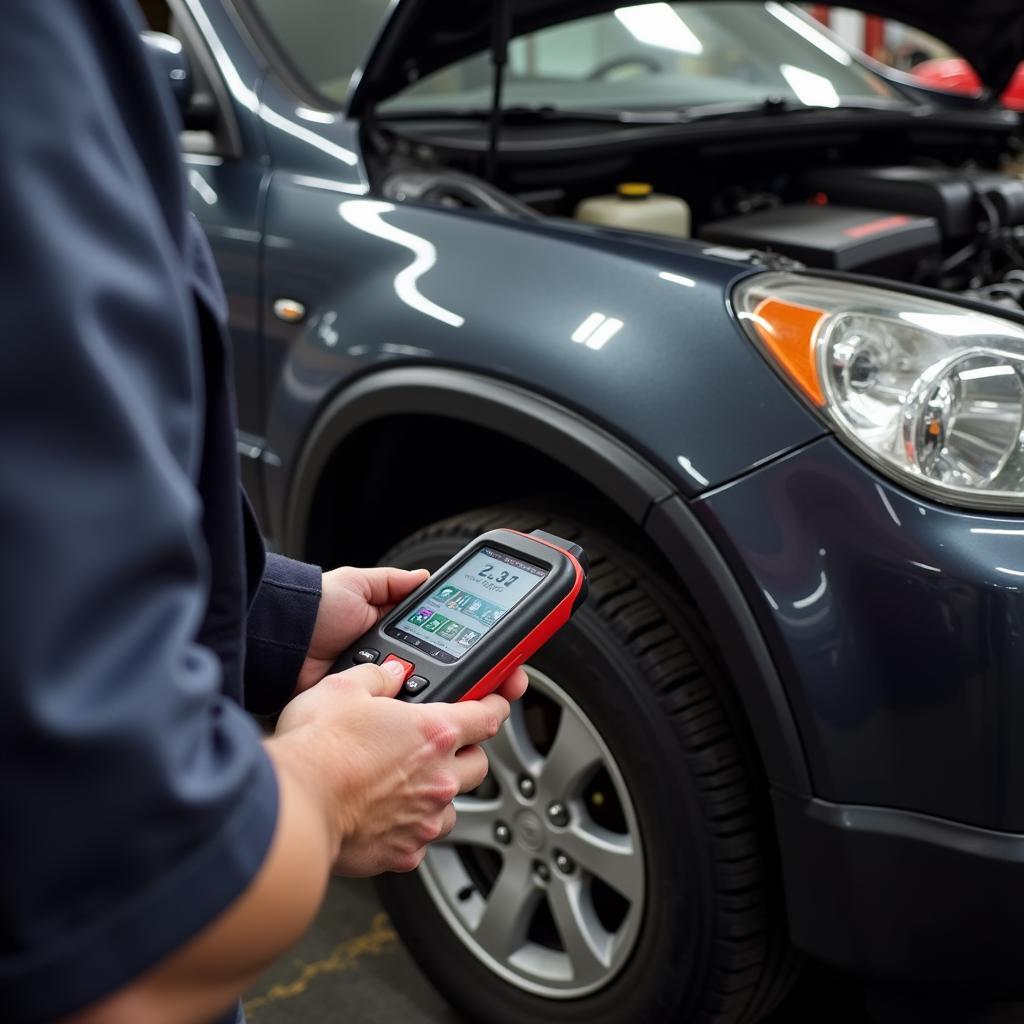A car diagnostic test is an essential procedure used to identify potential issues within a vehicle’s various systems. Utilizing a specialized tool known as a car diagnostic scanner, this test reads and interprets data from your car’s Engine Control Unit (ECU). This data provides valuable insights into the performance of your engine, transmission, exhaust system, and other critical components.
Understanding the Importance of a Car Diagnostic Test
Modern vehicles are complex machines with intricate electronic systems. When the check engine light illuminates on your dashboard, it signifies that the ECU has detected a problem. A car diagnostic test is crucial to decipher the meaning behind this warning light and pinpoint the root cause of the issue.
What Does a Car Diagnostic Test Tell You?
A car diagnostic test provides a wealth of information about your vehicle’s health, going beyond simply identifying the reason for the check engine light. Here are some key insights it can reveal:
- Engine Performance: The test assesses engine parameters such as air-fuel mixture, ignition timing, and RPM to ensure optimal performance and efficiency.
- Transmission Health: By analyzing data from the transmission control module, the test can detect issues with gear shifting, clutch operation, and fluid levels.
- Emissions System: The test monitors the performance of components like the catalytic converter and oxygen sensors, ensuring compliance with emission standards.
- Brake System: Diagnostic tests can reveal problems with the ABS system, brake fluid levels, and other brake-related components.
- Airbag System: The test examines the airbag control unit and sensors to ensure proper functioning in the event of a collision.
How is a Car Diagnostic Test Performed?
Performing a car diagnostic test involves connecting a diagnostic scanner to your car’s OBD-II port, usually located beneath the steering wheel. The scanner then retrieves and decodes the Diagnostic Trouble Codes (DTCs) stored in the ECU. These codes, often represented by a combination of letters and numbers, correspond to specific issues within the vehicle’s systems.
Benefits of Regular Car Diagnostic Tests
While a car diagnostic test is crucial when the check engine light appears, incorporating it into your regular vehicle maintenance schedule offers several advantages:
- Early Problem Detection: Regular tests can identify potential issues before they escalate into major repairs, saving you time and money in the long run.
- Improved Fuel Efficiency: Detecting and addressing issues related to engine performance and emissions can significantly improve your vehicle’s fuel economy.
- Enhanced Safety: By identifying problems with critical safety systems like brakes and airbags, regular tests contribute to a safer driving experience.
- Increased Resale Value: A well-maintained vehicle with a documented history of diagnostic tests is more appealing to potential buyers, potentially commanding a higher resale value.
Types of Car Diagnostic Scanners
There are various types of car diagnostic scanners available, catering to different needs and budgets:
- Basic Code Readers: These affordable devices primarily retrieve and display DTCs, providing a starting point for troubleshooting.
- Advanced Scan Tools: Utilized by professional mechanics, these comprehensive tools offer in-depth data analysis, live data streaming, and advanced programming capabilities.
- Smartphone Apps: Several mobile applications connect to your vehicle via the OBD-II port and offer basic diagnostic functionalities.
Choosing the Right Car Diagnostic Test Provider
When seeking a car diagnostic test, it’s essential to choose a reputable provider with experienced technicians. Here are factors to consider:
- Experience and Expertise: Look for providers with a proven track record in diagnosing and repairing various vehicle makes and models.
- Equipment and Technology: Ensure the provider utilizes up-to-date diagnostic equipment and software to ensure accurate results.
- Customer Service: Choose a provider known for its transparent communication, detailed explanations, and commitment to customer satisfaction.
Conclusion
A car diagnostic test is an indispensable tool for modern vehicle owners, offering invaluable insights into the health and performance of their cars. Regular testing not only helps identify and address issues early on but also contributes to improved fuel efficiency, enhanced safety, and potentially a higher resale value. If your check engine light is on or you’re due for routine maintenance, don’t hesitate to get car diagnostic test from a trusted provider.


